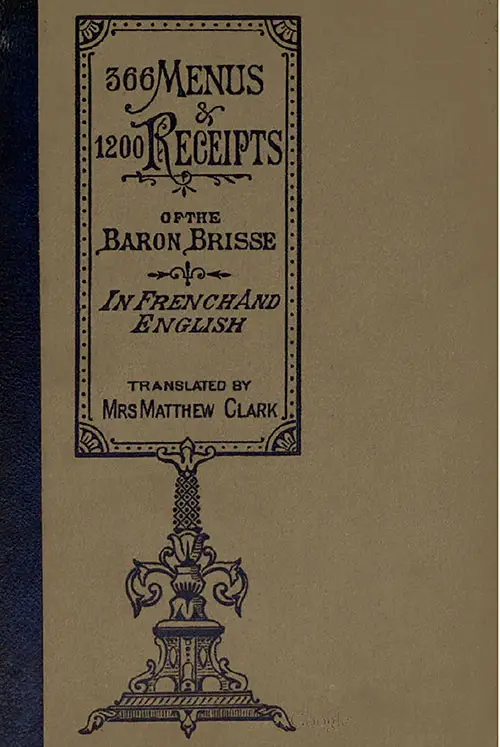366 Menus and 1200 Recipes of The Baron Brisse - 1882

In French And English
Second Edition
Translated by Mrs. Matthew Clark
London
Sampson Low, Marston, Searle, & Rivington
Crown Buildings, 188, Fleet Street
1882
London:
Printed by Gilbert and Rivington, Limited,
St. John's Square.
400 Pages including Index
Preface
This book, which was already one of the most useful and practical of cookery books, has been rendered more complete in this edition by many alterations and modifications.
The bills of fare are written entirely according to our French customs.
Dishes used by both rich and poor are given in their proper seasons.
The recipes have come from many different schools of cookery and are clearly and concisely explained.
In this edition, as in my previous ones, I have not attempted to give recipes for using up scraps, as this art is only useful when you run short of provisions; it is quite a mistake to imagine that warming up previously cooked meat is economical, as all good transformations must be expensive.
The only way to use up scraps of meat is to warm them in any of the simple sauces, recipes for which will be found further on.
Scraps of fowl or game must not come under this category, as all salmis and marinades have to be made from fowls or game which have been previously roasted.
Entries of game or fowl must always be warmed up, in the same sauce, if required to be used on the second day.
In cookery, above all things, " Nothing can come of nothing."
Translator’s Note
The first object I had in translating this work, was to please my cook; but having been asked by many of my friends to give them the recipes (in English) for some of the celebrated Baron's excellent dishes, I determined to allow my poor translation to appear in print. May I, under these circumstances, ask the forgiveness of all English cooks, if I venture to give them a few hints how best to carry out the views of one of the greatest of French chefs?
Soups. —The reader will at once see that no coloring is ever used in French soups.
Fish. —There are many kinds of fish mentioned, which you rarely see mentioned in the fishmongers' bills of fare, but they can be procured at any good fishmonger's if asked for, such as Garfish, Weaver, or Whiting Pollock. Crayfish in excellent condition can always be procured at Schell's, in Wigmore Street.
Beef. —Whenever boiled beef is mentioned, it means fresh, not salt meat.
Vegetables. —Celery roots and cardoons, both most delicious vegetables, are seldom seen at English dinner-tables, but they have been for sale at Martin's, in Covent Garden, for several years past.
Cooking wine. —Chablis is the white wine generally used for cooking in France; so in the recipes, I hope it will always be used, unless Madeira or Sherry is specially mentioned.
Bills of fare for fast days. —There are so many good dishes for our fast days given in this book, that I hope all Catholic families will try them, and perhaps pass happier Fridays than hitherto.
Edith Matthew Clark
